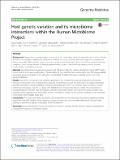Host genetic variation and its microbiome interactions within the Human Microbiome Project
Author(s)
Kolde, Raivo; Rahnavard, Gholamali; Vlamakis, Hera; Stevens, Christine; Huttenhower, Curtis; Franzosa, Eric A.; Hall, Andrew Brantley; Daly, Mark J.; Xavier, Ramnik Joseph; ... Show more Show less
Download13073_2018_Article_515.pdf (1.158Mb)
PUBLISHER_CC
Publisher with Creative Commons License
Creative Commons Attribution
Terms of use
Metadata
Show full item recordAbstract
Background: Despite the increasing recognition that microbial communities within the human body are linked to health, we have an incomplete understanding of the environmental and molecular interactions that shape the composition of these communities. Although host genetic factors play a role in these interactions, these factors have remained relatively unexplored given the requirement for large population-based cohorts in which both genotyping and microbiome characterization have been performed. Methods: We performed whole-genome sequencing of 298 donors from the Human Microbiome Project (HMP) healthy cohort study to accompany existing deep characterization of their microbiomes at various body sites. This analysis yielded an average sequencing depth of 32x, with which we identified 27 million (M) single nucleotide variants and 2.3 M insertions-deletions. Results: Taxonomic composition and functional potential of the microbiome covaried significantly with genetic principal components in the gastrointestinal tract and oral communities, but not in the nares or vaginal microbiota. Example associations included validation of known associations between FUT2 secretor status, as well as a variant conferring hypolactasia near the LCT gene, with Bifidobacterium longum abundance in stool. The associations of microbial features with both high-level genetic attributes and single variants were specific to particular body sites, highlighting the opportunity to find unique genetic mechanisms controlling microbiome properties in the microbial communities from multiple body sites.
Conclusions: This study adds deep sequencing of host genomes to the body-wide microbiome sequences already extant from the HMP healthy cohort, creating a unique, versatile, and well-controlled reference for future studies seeking to identify host genetic modulators of the microbiome. Keywords: Human Microbiome Project, Microbiome and human genetics, Human genome sequence, Microbiome metagenome sequence, Association studies
Date issued
2018-01Department
Institute for Medical Engineering and ScienceJournal
Genome Medicine
Publisher
BioMed Central
Citation
Kolde, Raivo, et al. “Host Genetic Variation and Its Microbiome Interactions within the Human Microbiome Project.” Genome Medicine, vol. 10, no. 1, Dec. 2018.
Version: Final published version
ISSN
1756-994X